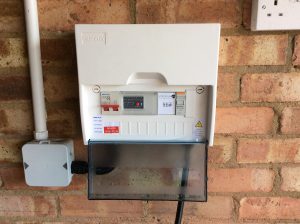Over the last few days I’ve been rethinking the best use of generated power.
The prioritisation of battery charging over water heating is clear due to the significant cost difference between day time electricity and any time gas, but the situation on car charging is more complex. It occurred to me that there could be times when prioritising battery charging and water might not always be the lowest cost solution since car charging avoiding mid-price nighttime electricity might be a bigger saving than a lesser amount of high value battery charging combined with low value gas-replacement.
For example, if we look at the lowest level of EV charging that amounts to about 1.4 kW. With our night-time rate of 7.87 p/kWh, 1.4kWh of solar power used for car charging saves 11.0 p of night time electricity. If the battery is maxed out at 800 VAh that saves 7.34 p of later day time electricity. The water heating using the balance of 0.6 kW saves a further 1.76 pence of any time gas. Thus the total save from 1.4 kWh used for a combination of battery charging plus water heating is 9.1 p, compared to 11.0 p from car charging – so it would appear to be better value to do 100% car charging when a 1.4 kW surplus exists.
 A bit of further analysis aimed to establish the point at which it became better value to charge the car, rather than combine battery charging and water heating, even if that involved a small level of mains import. The answer is that, with my energy costs, it makes sense to enable 1.4 kW of charger when 1.3 kW of export would have existed thereby potentially importing 0.1 kW. In practice this 0.1 kW may be supplied by the battery.
A bit of further analysis aimed to establish the point at which it became better value to charge the car, rather than combine battery charging and water heating, even if that involved a small level of mains import. The answer is that, with my energy costs, it makes sense to enable 1.4 kW of charger when 1.3 kW of export would have existed thereby potentially importing 0.1 kW. In practice this 0.1 kW may be supplied by the battery.
Given that the battery has priority by the way it’s wired, and takes up to 800 VA, then I intend to try a 500 W export threshold to start the car charger since 800 VA + 500W ~ 1.3 kW.
